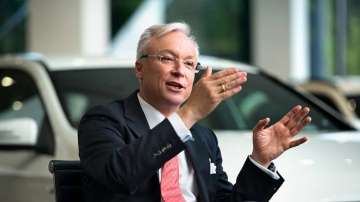GST: Hike in cess ceiling to hit 'Make In India' plans, say luxury automakers
The constant shift in policy makes our long-term planning for the market highly risky, and we think this would only have an adverse impact on the country's financial ratings, said Roland Folger, MD and CEO, Mercedes-Benz India

Luxury vehicle manufacturers have expressed disappointment over the GST Council's recommendation to the central government for a hike in maximum cess ceiling leviable on luxury, sports utility vehicles (SUVs) among others.
The Ministry of Finance in a statement said that decision to recommend a hike in the "maximum ceiling of cess" was taken at the Council's meeting on August 5.
"The GST Council considered the issue of cess leviable on motor vehicles in its 20th meeting held on August 5 and recommended that central government may move legislative amendments required for increase the maximum ceiling of cess leviable on motor vehicles falling under headings 8702 and 8703 including SUVs, to 25 per cent instead of present 15 per cent," the ministry said in a statement.
"However, the decision on when to raise the actual cess leviable on the same would be taken by the GST Council in due course," it said.
The ministry revealed that the decision to recommend a hike in cess cap was taken after the Council noticed that post the roll-out of GST, the total tax incidence on motor vehicles had come down as compared to pre-GST regime.
On industry's side, luxury car maker Mercedes-Benz India voiced its disappointment.
"We are highly disappointed with the decision. We believe this will be a strong deterrent to the growth of luxury cars in this country," Roland Folger, MD and CEO, Mercedes-Benz India, was quoted as saying in a statement issued by the company.
"As a leading luxury car maker, this will also affect our future plans of expansion under 'Make in India' initiative, which aims at making and selling world-class products in India, with the latest technology for end-consumers," he added.
Folger pointed out that the recommendation will reverse the positive momentum that the industry wanted to achieve with the introduction of the GST.
"With this hike in cess, we expect the volumes of the luxury industry to decelerate, thus offsetting any growth in the potential revenue generation that could have come with the estimated volume growth," Folger said.
He also called for the need for a long-term road-map for the luxury car industry in India.
"The constant shift in policy makes our long-term planning for the market highly risky, and we think this would only have an adverse impact on the country's financial ratings," Folger said.
On its part, Audi India announced a sales offer on a range of models including Audi A3, Audi Q3 and Audi A4.
"Keeping in mind the proposed increase in cess, this is an opportune time to join the Audi family and additionally also benefit from the privileges of the Audi India club," said Rahil Ansari, Head Audi India.
According to Shrikant Akolkar, Research Analyst- Automobiles, Angel Broking: "The likely hike in the cess rate from current 15 to 25 per cent is not expected to see a materially negative impact on the demand for the premium automobiles."
"The underlying demand remains healthy which is the driving force for the automobile sector. We believe that companies will be able to pass on the cess hikes on luxury vehicles/UVs to customers by price revision."
Further, Suresh Nandlal Rohira, Partner, Grant Thornton India LLP said: "The increase in compensation cess on luxury cars from 15 per cent to 25 per cent is purely an attempt of anomaly correction by the government on realising the revenue loss it would undergo."
"Although, it would take away the luxury for higher segment car buyers with an additional tax burden of 10 per cent, however such frantic changes and corrections for each sector may convulse the confidence of the Industry and also lead to re-planning of their sales strategy and cost impact thereon."